13078-04-1
| Name | anabasine |
|---|---|
| Synonyms |
(R,S)-3-(2-Piperidinyl)Pyridine
3-(piperidin-2-yl)pyridine Pyridine, 3-(2-piperidinyl)- Anabasine MFCD00006370 (±)-Anabasine DL-Anabasine 3-Piperidin-2-ylpyridine (R,S)-Anabasine 3-(2-Piperidinyl)pyridine (-)-ANABASINE |
| Description | (±) Anabasine is a biphasic muscle relaxant. |
|---|---|
| Related Catalog | |
| Target |
Human Endogenous Metabolite |
| Density | 1.0±0.1 g/cm3 |
|---|---|
| Boiling Point | 271.0±0.0 °C at 760 mmHg |
| Melting Point | 9ºC |
| Molecular Formula | C10H14N2 |
| Molecular Weight | 162.232 |
| Flash Point | 93.3±0.0 °C |
| Exact Mass | 162.115692 |
| PSA | 24.92000 |
| LogP | 0.85 |
| Vapour Pressure | 0.0±0.5 mmHg at 25°C |
| Index of Refraction | 1.524 |
| Storage condition | Refrigerator |
| Water Solubility | H2O: 10 mg/mL |
Synonym:AnabasineNeonicotin Section 2 - COMPOSITION, INFORMATION ON INGREDIENTS
Risk Phrases: 23/24/25 Section 3 - HAZARDS IDENTIFICATION EMERGENCY OVERVIEW
Toxic by inhalation, in contact with skin and if swallowed.Hygroscopic (absorbs moisture from the air).Light sensitive. Potential Health Effects Eye: May cause eye irritation. Skin: May cause skin irritation. Toxic in contact with skin. Ingestion: May cause irritation of the digestive tract. Toxic if swallowed. Inhalation: May cause respiratory tract irritation. Toxic if inhaled. Chronic: Not available. Section 4 - FIRST AID MEASURES Eyes: Immediately flush eyes with plenty of water for at least 15 minutes, occasionally lifting the upper and lower eyelids. Get medical aid immediately. Skin: Get medical aid immediately. Immediately flush skin with plenty of water for at least 15 minutes while removing contaminated clothing and shoes. Ingestion: Get medical aid immediately. Wash mouth out with water. Inhalation: Get medical aid immediately. Remove from exposure and move to fresh air immediately. If not breathing, give artificial respiration. If breathing is difficult, give oxygen. Notes to Physician: Section 5 - FIRE FIGHTING MEASURES General Information: As in any fire, wear a self-contained breathing apparatus in pressure-demand, MSHA/NIOSH (approved or equivalent), and full protective gear. Extinguishing Media: Use water spray, dry chemical, carbon dioxide, or chemical foam. Section 6 - ACCIDENTAL RELEASE MEASURES General Information: Use proper personal protective equipment as indicated in Section 8. Spills/Leaks: Absorb spill with inert material (e.g. vermiculite, sand or earth), then place in suitable container. Section 7 - HANDLING and STORAGE Handling: Do not breathe dust, vapor, mist, or gas. Do not get in eyes, on skin, or on clothing. Use only in a chemical fume hood. Storage: Keep away from sources of ignition. Store in a cool, dry place. Do not store in direct sunlight. Store in a tightly closed container. Section 8 - EXPOSURE CONTROLS, PERSONAL PROTECTION Engineering Controls: Use adequate ventilation to keep airborne concentrations low. Exposure Limits CAS# 13078-04-1: Personal Protective Equipment Eyes: Not available. Skin: Wear appropriate protective gloves to prevent skin exposure. Clothing: Wear appropriate protective clothing to prevent skin exposure. Respirators: Follow the OSHA respirator regulations found in 29 CFR 1910.134 or European Standard EN 149. Use a NIOSH/MSHA or European Standard EN 149 approved respirator if exposure limits are exceeded or if irritation or other symptoms are experienced. Section 9 - PHYSICAL AND CHEMICAL PROPERTIES Physical State: Liquid Color: colorless - yellow - orange Odor: Not available. pH: Not available. Vapor Pressure: Not available. Viscosity: Not available. Boiling Point: 270 - 272 deg C Freezing/Melting Point: 9 deg C Autoignition Temperature: Not available. Flash Point: 93 deg C ( 199.40 deg F) Explosion Limits, lower: Not available. Explosion Limits, upper: Not available. Decomposition Temperature: Not available. Solubility in water: Specific Gravity/Density: 1.046 Molecular Formula: C10H14N2 Molecular Weight: 162 Section 10 - STABILITY AND REACTIVITY Chemical Stability: Not available. Conditions to Avoid: Incompatible materials, light, exposure to moist air or water. Incompatibilities with Other Materials: Oxidizing agents. Hazardous Decomposition Products: Nitrogen oxides, carbon monoxide, carbon dioxide, acrid smoke and fumes. Hazardous Polymerization: Has not been reported Section 11 - TOXICOLOGICAL INFORMATION RTECS#: CAS# 13078-04-1 unlisted. LD50/LC50: Not available. Carcinogenicity: 2-Pyridin-3-ylpiperidine - Not listed by ACGIH, IARC, or NTP. Section 12 - ECOLOGICAL INFORMATION Section 13 - DISPOSAL CONSIDERATIONS Dispose of in a manner consistent with federal, state, and local regulations. Section 14 - TRANSPORT INFORMATION IATA Shipping Name: ALKALOIDS, LIQUID, N.O.S.* Hazard Class: 6.1 UN Number: 3140 Packing Group: II IMO Shipping Name: ALKALOIDS, LIQUID, N.O.S. Hazard Class: 6.1 UN Number: 3140 Packing Group: II RID/ADR Shipping Name: ALKALOIDS, LIQUID, N.O.S. Hazard Class: 6.1 UN Number: 3140 Packing group: II Section 15 - REGULATORY INFORMATION European/International Regulations European Labeling in Accordance with EC Directives Hazard Symbols: T Risk Phrases: R 23/24/25 Toxic by inhalation, in contact with skin and if swallowed. Safety Phrases: S 28A After contact with skin, wash immediately with plenty of water. S 36/37/39 Wear suitable protective clothing, gloves and eye/face protection. S 45 In case of accident or if you feel unwell, seek medical advice immediately (show the label where possible). WGK (Water Danger/Protection) CAS# 13078-04-1: No information available. Canada None of the chemicals in this product are listed on the DSL/NDSL list. CAS# 13078-04-1 is not listed on Canada's Ingredient Disclosure List. US FEDERAL TSCA CAS# 13078-04-1 is not listed on the TSCA inventory. It is for research and development use only. SECTION 16 - ADDITIONAL INFORMATION N/A |
| Symbol |

GHS06 |
|---|---|
| Signal Word | Danger |
| Hazard Statements | H300-H315-H319-H335 |
| Precautionary Statements | P261-P264-P301 + P310-P305 + P351 + P338 |
| Personal Protective Equipment | Eyeshields;Faceshields;full-face respirator (US);Gloves;multi-purpose combination respirator cartridge (US);type ABEK (EN14387) respirator filter |
| Hazard Codes | T:Toxic; |
| Risk Phrases | R23/24/25 |
| Safety Phrases | S28-S36/37/39-S45 |
| RIDADR | UN 3140 6.1/PG 2 |
| WGK Germany | 3 |
| RTECS | BV4375000 |
| Packaging Group | I |
| Hazard Class | 6.1 |
| HS Code | 2933990090 |
| Precursor 8 | |
|---|---|
| DownStream 8 | |
| HS Code | 2933990090 |
|---|---|
| Summary | 2933990090. heterocyclic compounds with nitrogen hetero-atom(s) only. VAT:17.0%. Tax rebate rate:13.0%. . MFN tariff:6.5%. General tariff:20.0% |

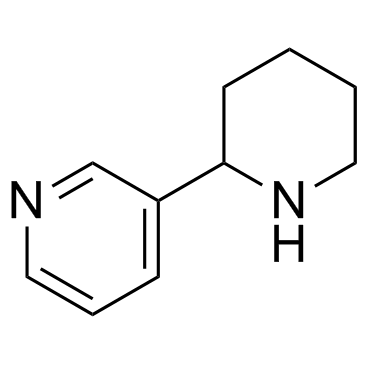
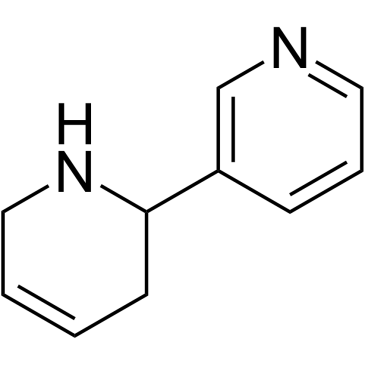
![N-[2-(pyridin-3-yl)piperidin-1-yl]benzamide structure](https://image.chemsrc.com/caspic/010/62332-19-8.png)
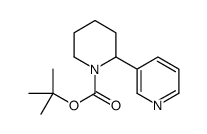
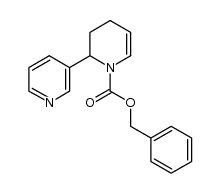

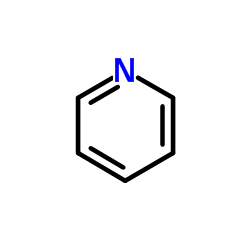
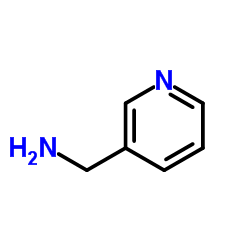
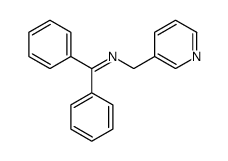
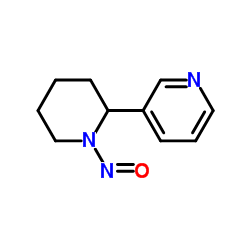
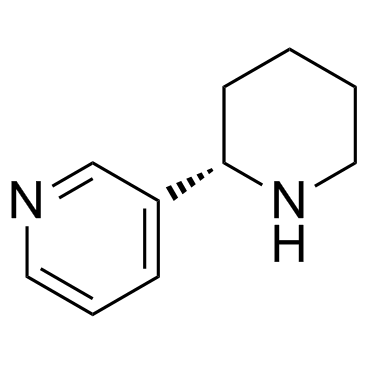
![3-[1-di(propan-2-yloxy)phosphorylpiperidin-2-yl]pyridine structure](https://image.chemsrc.com/caspic/438/139722-88-6.png)
![Methanone,phenyl[2-(3-pyridinyl)-1-piperidinyl]- structure](https://image.chemsrc.com/caspic/222/6944-24-7.png)
![1,2,3,4,5,6,1''',2''',3''',4''',5''',6'''-dodecahydro-[2,3',4',2'',5'',2''']quaterpyridine structure](https://image.chemsrc.com/caspic/146/50549-80-9.png)
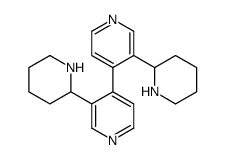
![3-[(2-pyridin-3-ylpiperidin-1-yl)methyl]-1,3-benzothiazole-2-thione structure](https://image.chemsrc.com/caspic/219/63771-10-8.png)